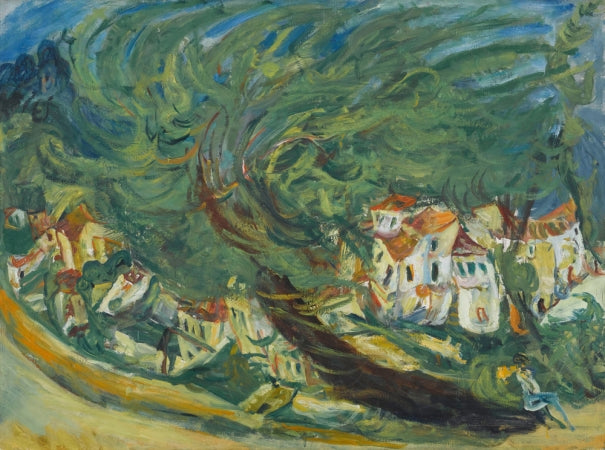Tanım
Chaim Soutine’s Leaning Tree, painted in 1924, is a powerful manifestation of the artist’s unique technique and style, which is associated with the Expressionist movement, although his work includes elements of Fauvism and Post-Impressionism. A prolific painter of Belarusian origin who settled in Paris, Soutine is known for his visceral and emotional approach to painting, where visual representation is often transformed into an intimate and personal experience.
At first glance, “Leaning Tree” evokes a sense of tension and movement through its dynamic compositions. The tree, the central subject of the work, is presented in a dramatic tilt that suggests a struggle against the forces of nature. Its twisted, almost anthropomorphic forms give the impression that the tree is bending, not out of weakness, but as a symbol of resistance to the elements. Soutine uses a technique of loose, almost aggressive brushstrokes, which bring a rich texture and sense of life to the work. This approach to the landscape reveals both the interaction between the artist and his surroundings and his quest to express the emotional complexity tied to nature.
The painting’s colour palette is remarkable, with a predominance of deep greens and earthy tones that suggest both the maturity of the vegetation and the emotional depth of the painting. Soutine applies colour in dense layers, creating an almost tangible atmosphere. The combination of warm and cool colours, together with intense shadows, contribute to the sense of depth and volume, creating an immersive visual experience. This use of colour and light reveals the artist’s ability to capture the essence of the moment, transporting us into the heart of the natural scene.
Throughout his career, Soutine explored diverse subject matter, from still life to portraiture, but it was in his landscapes that he successfully fused his personal vision with the natural world. In Leaning Tree, the viewer can sense the influence of Claude Monet and Vincent van Gogh, whose loose brushstroke methods and intense use of color were instrumental to Soutine. Unlike his predecessors, however, Soutine evokes a sense of restlessness; his landscapes are imbued with an emotionality that goes beyond mere visual representation.
While Leaning Tree does not feature human figures, the presence of the tree suggests a deep connection between humans and nature, which aligns with the broader philosophy of Expressionism, which often seeks to explore psychology and emotion through visual representation. In this sense, the work functions not only as a landscape, but also as a meditation on loneliness and struggle, concepts that resonated deeply with the European experience of the time, against a backdrop of profound and tumultuous change following World War I.
"Leaning Tree" remains a prominent example of Soutine's art, showcasing his unique ability to capture the emotive essence of the natural world. This painting reflects not only the unmistakable character of his style, but also his ability to connect with the viewer on a visceral level, inviting them to explore the life that springs forth from the simplest forms of nature. His work is a reminder of how painting can transcend the merely visual to become a meditation on existence itself.
KUADROS ©, a famous painting on your wall.
Hand-made oil painting reproductions, with the quality of professional artists and the distinctive seal of KUADROS ©.
Painting reproduction service with satisfaction guarantee. If you are not completely satisfied with the replica of your painting, we will refund 100% of your money.

